 How does a country recover from genocide? Is it even possible? I remember thinking this same thought when I visited the concentration camps in Germany. I feel it even more strongly here, though I don’t know why. Maybe it’s because the devastation in Rwanda is more recent. Or maybe it’s because Rwanda got no international support. In fact, when they said they needed help, the UN pulled out of Rwanda, claiming it was an internal conflict. Or maybe it’s the tools used to kill people – machetes and clubs, and using HIV as a weapon. And that the strategy was to torture, not just kill… Regardless, more than a million people died in this country of ten million. More were maimed, infected, and permanently injured. In Tanzania, when we see people with limps or missing limbs, it’s often health related. In Rwanda, the cause is more likely that they were injured in the genocide.
How does a country recover from genocide? Is it even possible? I remember thinking this same thought when I visited the concentration camps in Germany. I feel it even more strongly here, though I don’t know why. Maybe it’s because the devastation in Rwanda is more recent. Or maybe it’s because Rwanda got no international support. In fact, when they said they needed help, the UN pulled out of Rwanda, claiming it was an internal conflict. Or maybe it’s the tools used to kill people – machetes and clubs, and using HIV as a weapon. And that the strategy was to torture, not just kill… Regardless, more than a million people died in this country of ten million. More were maimed, infected, and permanently injured. In Tanzania, when we see people with limps or missing limbs, it’s often health related. In Rwanda, the cause is more likely that they were injured in the genocide.
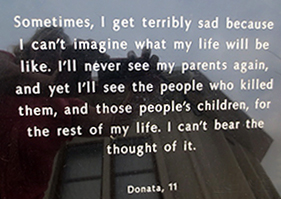 The Genocide Memorial in Rwanda was about all I could handle. It’s educational – and their goal is to teach the children of Rwanda what happened so that it doesn’t happen again. In as much as it’s educational, it’s also emotional. Old weapons, blood-stained clothing torn from machetes and bullet holes, photos, and mass graves can’t help but make you feel sick. I’d always known that the conflict was between the Hutu and the Tutsi people, but I’d assumed that these were two tribes. The reality is much more sobering. Hutu and Tutsi were socio-economic classes. In 1923, if you had more than 10 cows, you were Tutsi, and if you had less than 10 cows, you were Hutu. And your class changed, depending upon your wealth. And then, the government started registering people. When they registered them, it made their status permanent, regardless of how their wealth changed. So the genocide put neighbor against neighbor and brother against brother.
The Genocide Memorial in Rwanda was about all I could handle. It’s educational – and their goal is to teach the children of Rwanda what happened so that it doesn’t happen again. In as much as it’s educational, it’s also emotional. Old weapons, blood-stained clothing torn from machetes and bullet holes, photos, and mass graves can’t help but make you feel sick. I’d always known that the conflict was between the Hutu and the Tutsi people, but I’d assumed that these were two tribes. The reality is much more sobering. Hutu and Tutsi were socio-economic classes. In 1923, if you had more than 10 cows, you were Tutsi, and if you had less than 10 cows, you were Hutu. And your class changed, depending upon your wealth. And then, the government started registering people. When they registered them, it made their status permanent, regardless of how their wealth changed. So the genocide put neighbor against neighbor and brother against brother.
There were several mini-genocides that preceded the massive genocide in 1994. But in April of 1994, Rwandans were being slaughtered at a rate of 1000 every 20 minutes. And the world did nothing. It shocks and saddens me. How could we have let this happen? My heart races and eyes swell with tears just thinking about it.
I don’t know what I expected coming into Rwanda. When I travel in Africa, I try not to expect anything, and let the country tell me what it needs to tell me. But with Rwanda, I had definite expectations. I knew about the genocide – so I think I expected despair, and destruction. I didn’t expect it to be the most developed African nation that I have visited. Yes, I realize that South Africa is more developed – but I haven’t been there yet (maybe next year?) But compared to the rest of East Africa, Rwanda is upscale. And the people seem to be moving on. While there is still PTSD – and how could there not be? – there is also a lot of grace here. There is a genocide forgiveness campaign. And people are actively working to move beyond the past. They’re making sure that children are being educated, and that people have jobs.
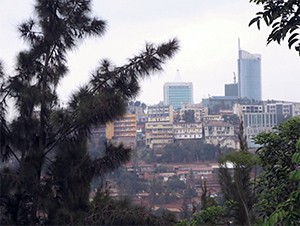 When we reached Rwanda from the Ugandan border, I was immediately struck by the landscape. It’s very hilly – and the hills are terraced with farms. It looks like the countryside of France or Spain. The roofs of the houses are tiled in a Mediterranean style. Kigali, the capital city, is built over several hills, with plenty of views out across the city. The streets are paved, and there are curbs and sidewalks. If it weren’t for the air pollution, you might think you were on a street in Europe. OK, maybe not Europe. But not Africa either. There are stoplights – lots of real stoplights that count down how many seconds are left of a green light or a red light. Traffic is under control. Things like speed limits and wearing helmets are enforced. In fact, the whole country seems to be very tightly controlled. Perhaps that shouldn’t be a huge surprise, as this is a military state, and there are soldiers with guns everywhere.
When we reached Rwanda from the Ugandan border, I was immediately struck by the landscape. It’s very hilly – and the hills are terraced with farms. It looks like the countryside of France or Spain. The roofs of the houses are tiled in a Mediterranean style. Kigali, the capital city, is built over several hills, with plenty of views out across the city. The streets are paved, and there are curbs and sidewalks. If it weren’t for the air pollution, you might think you were on a street in Europe. OK, maybe not Europe. But not Africa either. There are stoplights – lots of real stoplights that count down how many seconds are left of a green light or a red light. Traffic is under control. Things like speed limits and wearing helmets are enforced. In fact, the whole country seems to be very tightly controlled. Perhaps that shouldn’t be a huge surprise, as this is a military state, and there are soldiers with guns everywhere.
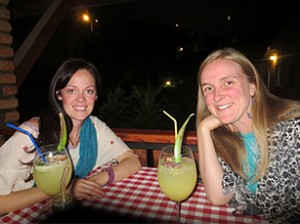 There are also an abundance of NGOs here. As you traverse the city, you see NGO after NGO. I’ve heard of most of them, and support a couple of them, like Women for Women International. The large number of NGOs brings out the mzungus (white people). And there are businesses that cater to the white people. People call Kigali the Portland of Africa because of the food, art, dance, music, and coffee. We’ve eaten at an Italian restaurant that is crazy good – and even has chocolate mousse for desert! We’ve also spent many hours at a coffee shop that is the Starbucks of Rwanda, called Bourbon – complete with a grande, caramel macchiato. Definitely Starbucks-ish. And we went for bagels yesterday at the African Bagel Company. Though I haven’t been yet, I’m told that there are sushi restaurants as well.
There are also an abundance of NGOs here. As you traverse the city, you see NGO after NGO. I’ve heard of most of them, and support a couple of them, like Women for Women International. The large number of NGOs brings out the mzungus (white people). And there are businesses that cater to the white people. People call Kigali the Portland of Africa because of the food, art, dance, music, and coffee. We’ve eaten at an Italian restaurant that is crazy good – and even has chocolate mousse for desert! We’ve also spent many hours at a coffee shop that is the Starbucks of Rwanda, called Bourbon – complete with a grande, caramel macchiato. Definitely Starbucks-ish. And we went for bagels yesterday at the African Bagel Company. Though I haven’t been yet, I’m told that there are sushi restaurants as well.
But what comes with the western food is the western prices. Rwanda is more expensive than any of the other East African nations. We’re not finding any hotels for $20/night here. The cheap ones are $60/night. And the upscale ones are $300/night and up. There’s also fashion that is more Lady Gaga, than African practical. We encountered a shoe store where the majority of the shoes had spikes, and cost $100 and up. Who wears these?
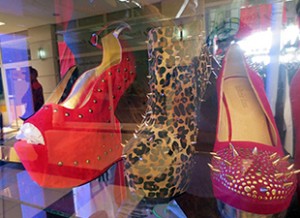 It’s the cost that will prohibit us from offering global health classes here. Nevertheless, we intended to make contact with people at the Ministry of Health so that NUNM grads could practice here.
It’s the cost that will prohibit us from offering global health classes here. Nevertheless, we intended to make contact with people at the Ministry of Health so that NUNM grads could practice here.
Who knew that knocking on doors at the Ministry of Health was the best way to meet a Rwandan who has lived in Portland? We spent Friday trying to make connections at the Rwandan Ministry of Health. The first office door we knocked on had students who were working on different project. When I said we were from Portland, one of the Rwandan students said, “No way! I learned English at Lewis and Clark College!” How unlikely is that??? Most Africans we meet have never heard of Oregon. We have to tell them that it’s north of California. And this woman lived a mile from my house.
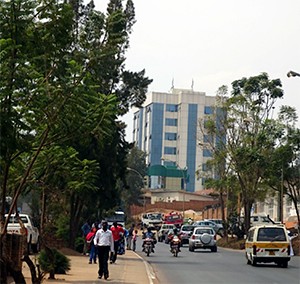 We met several very nice administrative assistants and security guards at the Ministry of Health, and absolutely no one with any power. It turned out that the Minister of Health is out because Clinton is in town. How many presidents have been in Africa while we were here? Obama, Bush, and Clinton… Africa is a popular spot for American presidents, apparently. Fortunately, the admin staff was knowledgeable. They told us that a lot of the information for NDs becoming licensed in Rwanda is online. They also told us that they have an exchange program with several medical school faculty who come and teach in their curriculum. It requires an official Memorandum of Understanding between their medical school and the US school. I’m thinking that this should be something NUNM should pursue.
We met several very nice administrative assistants and security guards at the Ministry of Health, and absolutely no one with any power. It turned out that the Minister of Health is out because Clinton is in town. How many presidents have been in Africa while we were here? Obama, Bush, and Clinton… Africa is a popular spot for American presidents, apparently. Fortunately, the admin staff was knowledgeable. They told us that a lot of the information for NDs becoming licensed in Rwanda is online. They also told us that they have an exchange program with several medical school faculty who come and teach in their curriculum. It requires an official Memorandum of Understanding between their medical school and the US school. I’m thinking that this should be something NUNM should pursue.
Medical education in Africa frustrates me. It’s not that the education itself is poor. In some cases it is, and in some cases it isn’t. My frustration lies in that the medical education here is not realistic for the countries in question. Conventional medical schools from the US and Europe come in and provide training in pharmacology and surgery. But these are disciplines that cannot be practiced in the villages. There are no surgical suites, and very few tools are even available. You can get bottled water, but nothing coming out of the tap is sterile. And sterile air? Highly unlikely. Yet, again and again, I hear of African countries employing more and more western medical approaches to education. It’s so short-sighted. It just leads to more brain drain.
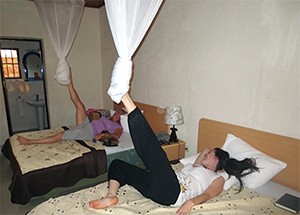 Natural medicine may be more realistic. The resources are available to practice it in the villages, and it’s far more sustainable than conventional medicine. I would still hesitate to push natural medicine on people of Africa. There’s likely a hybrid that is appropriate. And what really needs to happen is that African countries need to sit down and develop African solutions for their shortage of medical personnel, rather than trying to apply western solutions. Rwanda may be forward thinking enough at this point in their development to consider it.
Natural medicine may be more realistic. The resources are available to practice it in the villages, and it’s far more sustainable than conventional medicine. I would still hesitate to push natural medicine on people of Africa. There’s likely a hybrid that is appropriate. And what really needs to happen is that African countries need to sit down and develop African solutions for their shortage of medical personnel, rather than trying to apply western solutions. Rwanda may be forward thinking enough at this point in their development to consider it.
In addition to work, we got some great entertainment in Rwanda. We started by inventing our own entertainment. May I suggest to you a great new form of exercise called “mosquito net pilates”. I know you’re dying to know what that is. Mosquito nets hang above the beds, and are usually knotted when they aren’t in use. We lay on the bed and bat the nets around with our feet. When we realized that this was amusing us, we knew it was time to head back to the states.
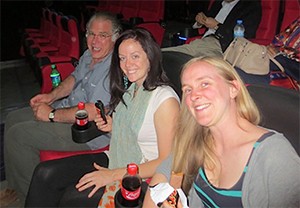 Oh, there are more typical modes of entertainment if you’re aren’t into mosquito net pilates. We’ve been to the movies a couple of times. We were thrilled to learn that there was a modern movie theater not five minutes from our hotel. And what was playing? The Lone Ranger. An American western? Why not. TIA. As I’ve mentioned, Rwanda is very organized and structured. When you buy a ticket, you pick out your seat. They haven’t figured out the popcorn and candy thing yet. Yes, they sell popcorn, but it was somewhat moldy – suggesting that they make it once a week or so. The Mars bars had melted and re-solidified. But the movie itself was fun. Mark had been needing another dose of American culture. He’s been very homesick, actually left early for Amsterdam. He’s just done with Africa.
Oh, there are more typical modes of entertainment if you’re aren’t into mosquito net pilates. We’ve been to the movies a couple of times. We were thrilled to learn that there was a modern movie theater not five minutes from our hotel. And what was playing? The Lone Ranger. An American western? Why not. TIA. As I’ve mentioned, Rwanda is very organized and structured. When you buy a ticket, you pick out your seat. They haven’t figured out the popcorn and candy thing yet. Yes, they sell popcorn, but it was somewhat moldy – suggesting that they make it once a week or so. The Mars bars had melted and re-solidified. But the movie itself was fun. Mark had been needing another dose of American culture. He’s been very homesick, actually left early for Amsterdam. He’s just done with Africa.
On Saturday night, Maria and I went to White House Down, another popular movie. This was a riot. The Rwandans were totally into White House Down. They oohhh, and ahhhed, clapped, and cheered. And when the movie was over, they gave me and Maria the thumbs up, as if just by being American, we were somehow responsible for the movie. I don’t know if I’ve ever had so much fun at a movie! It was a late movie, and it was 11:30 p.m. before it was over. We thought we were going to have to negotiate for a taxi to get home. But as we left the theater, before we got outside, the taxi driver who had dropped us off called out to us. He was waiting right outside the door to our theater so we would be safe, and he could take us back to the hotel. How sweet is that?
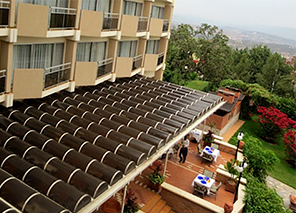 Tonight is our last night in Rwanda – and in fact our last night in Africa. Maria and I moved from the Step Inn Motel to the Mille Collines, the movie featured in the Hotel Rwanda. A little bit of luxury before I head back to Portland, and Maria heads on to Vietnam is much needed. Currently there’s a Rwandan band playing their version of Kool & the Gang’s “Get Down On It” by the pool. We can hear it from our room. They already covered Lionel Richie. Oh yes, we’ve entered the 70s… We may be doing some disco tonight. Too bad I left my polyester at home.
Tonight is our last night in Rwanda – and in fact our last night in Africa. Maria and I moved from the Step Inn Motel to the Mille Collines, the movie featured in the Hotel Rwanda. A little bit of luxury before I head back to Portland, and Maria heads on to Vietnam is much needed. Currently there’s a Rwandan band playing their version of Kool & the Gang’s “Get Down On It” by the pool. We can hear it from our room. They already covered Lionel Richie. Oh yes, we’ve entered the 70s… We may be doing some disco tonight. Too bad I left my polyester at home.
I’ll write some final thoughts on my way home.
Love from Rwanda!
Heather